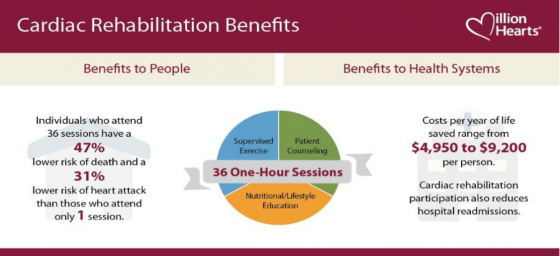Help Million Hearts® achieve this important goal by 2020: 70% of eligible patients will participate in a cardiac rehabilitation program.
Million Hearts®, a national initiative co-lead by the Centers for Disease Control (CDC) and the Centers for Medicare & Medicaid Services (CMS), has the bold aim of preventing 1 million heart attacks and strokes in 5 years (2018-2022). This involves three priority areas: keeping people healthy, optimizing care and targeting priority populations.
Exploring high value community resources for patients with chronic conditions, Cardiac Rehabilitation services are recommended for those who have experienced heart attack, heart failure, angioplasty or heart surgery. Often located in hospitals, medical office complexes, or YMCA’s, these programs are proven to improve strength after a cardiac event and save lives. Unfortunately, they are largely underutilized. Nationwide, only 20% of eligible candidates participate in Cardiac Rehab. Million Hearts® has challenged practitioners to increase participation to 70%.
Cardiac rehabilitation services include medically supervised exercise counseling and training, education for heart-healthy living, counseling for stress management and other psychosocial issues and ongoing coaching support for long-term lifestyle sustainability. Services are generally covered by most health insurance plans for up to 36 sessions.
There is strong evidence to show that Cardiac rehabilitation saves lives. It substantially reduces the risk of death for individuals who have received a qualifying diagnosis or cardiac procedure. Cardiac rehabilitation benefits patients in many ways. People who attend cardiac rehabilitation programs live longer and are less likely to have a heart attack. Cardiac rehabilitation reduces the chances of being re-hospitalized, helps patients recover strength, and builds skills in managing medications and activities. Participants in cardiac rehabilitation are less likely to feel depressed.

Only a portion of eligible patients participate in cardiac rehabilitation, even after being referred. And only 10% of patients with heart failure are referred to these lifesaving programs. Most initial referrals occur while the patient is still in the hospital recovering from a heart attack or heart surgery, but it is critical that primary care providers, care coordinators, and health coaches encourage participation once the patient has been discharged. Health coaching skills assist the patient to work through their ambivalence, barriers and potential fears of participation. Identifying support such as transportation, assuring insurance coverage and family involvement can make a significant impact on patient recruitment. To locate cardiac rehabilitation programs in your area, contact the American Association of Cardiac and Pulmonary Rehabilitation at www.aacvpr.org.
Million Hearts® is encouraging these resources to assist in patient recruitment and to prioritize referrals as a life-saving best practice strategy.
Cardiac Rehabilitation Fact Sheet
Cardiac Rehabilitation Benefits
Cardiac Rehabilitation Professionals:
Formal training in health coaching skills can significantly impact your success in guiding patient behavior change. Consider enrolling in our convenient Clinical Health Coach® Online or Clinical Health Coach® Fusion trainings. Information can be found at www.clinicalhealthcoach.com.
| The Clinical Health Coach is so valuable in being able to connect with patients. From a nursing perspective we’ve been taught to educate, educate, educate. This gives us a different approach. It allows the patient to come to those goals themselves with assistance from us to apply those goals. Whether it’s their diet, their emotional state or their chronic condition. We’re getting the tools, the template to guide those patients into making healthier decisions. I think clinical health coaching brings very valuable benefits to patients to help them maintain their health. — Cardiac Rehab Nurse |
Leave a Reply